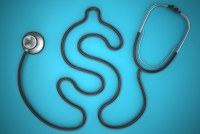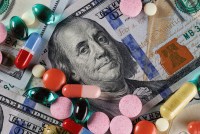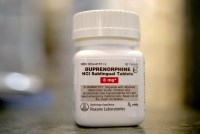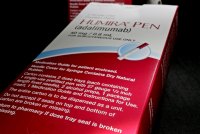Latest KFF Health News Stories
What the Health Care Sector Was Selling at the J.P. Morgan Confab
When bankers and investors flocked to San Francisco for the largest gathering of health care industry investors, the buzz was all about artificial intelligence, the next hit weight-loss drug, and new opportunities to make money through nonprofit hospitals.
Trump Official Who OK’d Drugs From Canada Chairs Company Behind Florida’s Import Plan
Alex Azar advanced Canadian drug importation as Donald Trump’s secretary of Health and Human Services. Now he chairs the board of a company managing Florida’s importation program.
Es común que altos funcionarios de ambos partidos dejen el servicio público por trabajos o puestos en juntas directivas, a menudo mejor remunerados, en empresas de las industrias que antes regulaban
Alex Azar’s Unusual Spin Through the Revolving Door
Washington’s infamous revolving door took an unusual turn for former Health and Human Services secretary Alex Azar. Azar spent about a decade with pharmaceutical giant Eli Lilly and Co. before coming to the nation’s capital to lead HHS in the Trump administration. But in September 2020, just a couple of months before former president Donald […]
Journalists Track Medical Device Malfunctions, Opioid Settlement Payments, and Abortion Bans
KFF Health News and California Healthline staffers made the rounds on national and local media this week to discuss their stories. Here’s a collection of their appearances.
Pacientes con narcolepsia enfrentan una doble pesadilla: escasez de medicamentos y estigma
Se estima que una de cada 2,000 personas en los Estados Unidos vive con narcolepsia (más de 160,000 en todo el país).
Patients With Narcolepsy Face a Dual Nightmare of Medication Shortages and Stigma
It’s been more than a year since the FDA declared a national shortage of Adderall, and it’s affecting more than just patients with ADHD. Those with narcolepsy, a much rarer condition, are often treated with the same medication. Without it, they’re often unable to drive or function as usual.
A New Test Could Save Arthritis Patients Time, Money, and Pain. But Will It Be Used?
Stories of chronic pain, drug-hopping, and insurance meddling are all too common among patients with rheumatoid arthritis. Precision medicine offers new hope.
The Market for Biosimilars Is Funky. The Industry Thinks PBMs Are To Blame
Over the past year there’s been movement to rein in the three big PBMs, which face little regulation though they help set drug prices and drug choices for 80 percent of Americans and their doctors. The House voted Dec. 11, 320-71, for legislation that would require the PBMs to change some of the ways they […]
Colorado culpa a Biden y a farmacéuticas por retrasar importaciones de medicamentos de Canadá
Los consumidores estadounidenses pagan algunos de los precios más altos del mundo por medicamentos de marca. En Canadá, el gobierno controla los precios.
Colorado Blames Biden Team and Drugmakers for Delaying Canadian Imports
Colorado officials say they haven’t been able to stand up a program to import drugs from Canada because of drugmaker opposition — and the Biden administration’s inaction.
Colorado Says Drug Industry Blocked Its Canada Dreams – And Biden Hasn’t Helped
Colorado’s leaders had grand plans to import cheaper medicines from Canada, after the Trump administration issued rules in 2020 allowing states to try it. But officials in Denver say they’ve been stymied by opposition from drugmakers — as well as the Biden administration’s inaction on the policy. That’s according to a Dec. 1 report we […]
Health Care Is Front and Center as DeSantis and Newsom Go Mano a Mano
Florida’s Republican Gov. Ron DeSantis and California’s Democratic Gov. Gavin Newsom will square off in a first-of-its-kind debate on Nov. 30. KFF Health News compared the political rivals’ health care positions, showing how their policies have helped — or hindered — the health of their states’ residents.
La atención de salud, en el centro del debate entre DeSantis y Newsom
El candidato presidencial republicano Ron DeSantis y el gobernador demócrata Gavin Newsom —rivales políticos y representantes de la América roja y azul— se enfrentarán en un debate sin precedentes el 30 de noviembre en Georgia.
Evolving Overdose Crisis Shakes Previously Effective Treatments
The prevalence of synthetic drugs is undercutting a previously effective and widely embraced opioid use disorder treatment tactic. Now, the model pioneered in Vermont a decade ago and adopted at sites nationwide, especially in hard-to-reach rural areas, is being forced to evolve.
Biden Administration’s Limit on Drug Industry Middlemen Backfires, Pharmacists Say
A rule taking effect Jan. 1 was intended to stop one set of abuses by pharmacy benefit managers, or PBMs, but some pharmacists say it’s enabling these price brokers to simply do new things unfairly.
California Expands Paid Sick Days and Boosts Health Worker Wages
Gov. Gavin Newsom signed legislation expanding paid sick leave to five days, extending bereavement leave to miscarriages and failed adoptions, and approving an eventual $25-an-hour health care minimum wage. Still, in a possible sign of national ambitions, the Democrat vetoed free condoms in schools and refused to decriminalize psychedelic mushrooms.
Biden Pick to Lead NIH Finally Has Her Day, but Still Gets Caught Up in Drug Price Debate
Monica Bertagnolli, the president’s choice to head the National Institutes of Health, appeared before a Senate committee this week. Her confirmation has been held up by Sen. Bernie Sanders (I-Vt.), who has demanded President Joe Biden work more aggressively to lower prescription drug prices.
What the Health? From KFF Health News: Health Funding in Question in a Speaker-Less Congress
A bitterly divided Congress managed to keep the federal government running for several more weeks, while House Republicans struggle — again — to choose a leader. Meanwhile, many people removed from state Medicaid rolls are not finding their way to Affordable Care Act insurance, and a major investigation by The Washington Post attributes the decline in U.S. life expectancy to more than covid-19 and opioids. Lauren Weber of The Washington Post, Victoria Knight of Axios, and Sarah Karlin-Smith of the Pink Sheet join KFF Health News chief Washington correspondent Julie Rovner to discuss these issues and more. Also this week, Rovner interviews physician-author-playwright Samuel Shem about “Our Hospital,” his new novel about the health workforce in the age of covid.
Save Billions or Stick With Humira? Drug Brokers Steer Americans to the Costly Choice
Thousands of patients with autoimmune diseases who rely on Humira, with a list price of $6,600 a month, could get financial relief from new low-cost rivals. So far, the pharmacy benefit managers that control drug prices in America have not delivered on those savings.




















